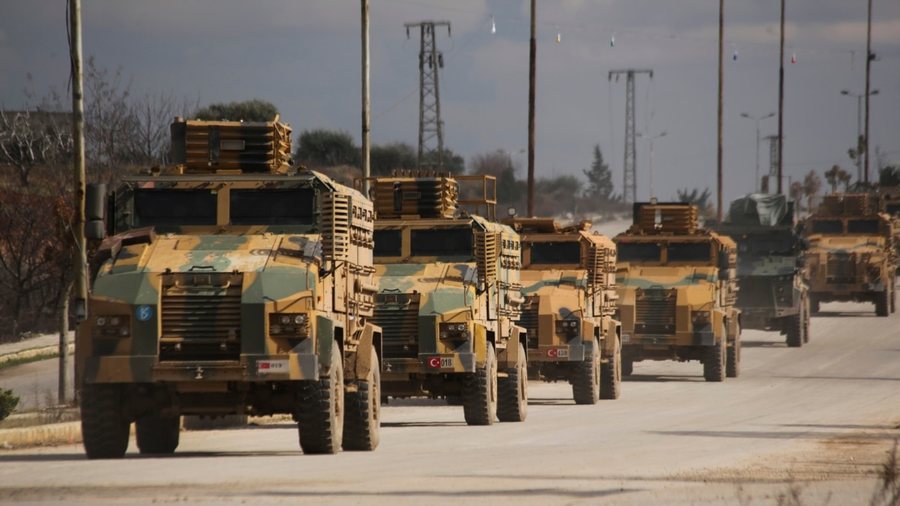
The fall of Bashar al-Assad's government at the hands of rebels, including those backed by Ankara, has made Turkey the dominant foreign power in Syria, at the expense of Iran and its ally Russia.
Turkey and Iran have been competing against each other for years to extend their influence in the South Caucasus, and it seems that the rivalry between them has now reached the Levant.
"The Islamic Republic has had tremendous concerns about Turkish influence in Syria, whether economic, political or military, long before the fall of Assad. But with the loss of Iran's only state ally in the region, these concerns are expected to increase more and more," said Behnam Taleblu, Iran analyst at the Washington-based Foundation for Defense of Democracies (FDD).
However, experts say that Turkey's ever-growing profile in Syria, to the detriment of Iran, does not necessarily mean that relations between Ankara and Tehran will be significantly affected.
After the start of the Syrian civil war in 2011, Iran and Russia supported Assad, while Turkey supported rebel groups that opposed his rule.
Iran needed Assad to stay in power in order to use Syria as a platform to finance and arm its partners and proxies, especially the Lebanese group Hezbollah.
For Russia, Assad's rule allowed Moscow to retain the Hmeimim air base and the naval base at Tartus, giving it easier access to the Middle East, North Africa and the Mediterranean Sea.
On the other hand, Ankara in Syria wanted a government more in line with its regional vision and policies, especially those that would rein in Kurdish groups in northeast Syria. A coalition of Kurdish parties, including the Democratic Union Party (PYD), leads the Autonomous Administration of North and East Syria.
The PYD's armed wing, the People's Protection Units (YPG), leads the US-backed Syrian Democratic Forces (SDF).
"Turkey has had three main concerns in Syria: fighting the YPG/PYD, enabling the return of Syrian refugees to Syria and preventing further refugee flows to Turkey," said Daria Isachenko, a Turkey expert at the German Institute for International Affairs. and Security.
The fall of Assad on December 8 has halted the flow of refugees to Turkey, but "the first two concerns remain," Daria Isachenko added.
Syria is now virtually controlled by the US-designated terrorist organization Hayat Tahrir al-Sham (HTS), and its allies – some of whom are linked to Iran's rival Turkey.
Isachenko says Turkey's growing influence in Syria could further strengthen Ankara's position in the Mediterranean if Turkey signs a Libya-style maritime deal with the new authorities in Damascus.
The rise of Turkey's prestige and the weakening of Iran's position in Syria could have consequences for developments in the South Caucasus, where Iran, Russia and Turkey are fighting for influence.
Experts say that while the Astana talks – a format sponsored by the three countries to end the conflict in Syria – may have failed, they still served as a platform for managing different interests.
"Coordination and consultation on conflict management between Turkey and Iran, as well as Russia, in the Middle East and the South Caucasus should not be ruled out," said Daria Isachenko.
She added that even in Syria, Turkey and Iran can find some common interests, such as finding a common opponent like Israel, which entered the Syrian territory immediately after the fall of Assad.
However, some argue that Tehran will try to undermine Turkey's influence in Syria, hoping to turn the country into a so-called "axis of resistance" – Iran's loose network of allies and regional proxies.
"The Islamic Revolutionary Guard Corps will look for ways to reverse influence in Syria," said Behnam Taleblu of the Foundation for the Defense of Democracies (FDD).
US support for the Kurdish-led Syrian Democratic Forces (SDF) has weakened in recent years due to a combination of factors, including the withdrawal of most US troops in 2018 and 2019 and pressure from the NATO ally. , Turkey.
Ankara, which launched an incursion into northern Syria in 2019 against Kurdish forces, is now in a strong position to challenge the Kurds further, experts say.
Since Assad's fall, Ankara-backed rebel groups have clashed with Kurdish forces and taken the previously Kurdish-held towns of Manbij and Tarafat near the border with Turkey.
Wladimir van Wilgenburg, an Iraqi Kurdistan-based analyst who co-authored the book on the Syrian Kurds, says the presence of the 900 U.S. troops that remain may provide some protection for the Kurds, but the situation remains uncertain.
"The new administration in Damascus is likely to prefer relations with Turkey over the SDF," he said.
"The situation is difficult for the Kurds, unless they reach an agreement with HTS", according to him.
HTS leader Ahmad al-Sharaa, formerly known by the nom de guerre Abu Muhammad al-Jolani, wants to unite all armed groups in Syria under a single banner. But if the SDF were to join, that would be the end of Kurdish autonomy in Syria, Wilgenburg says. REL (A2 Televizion)











